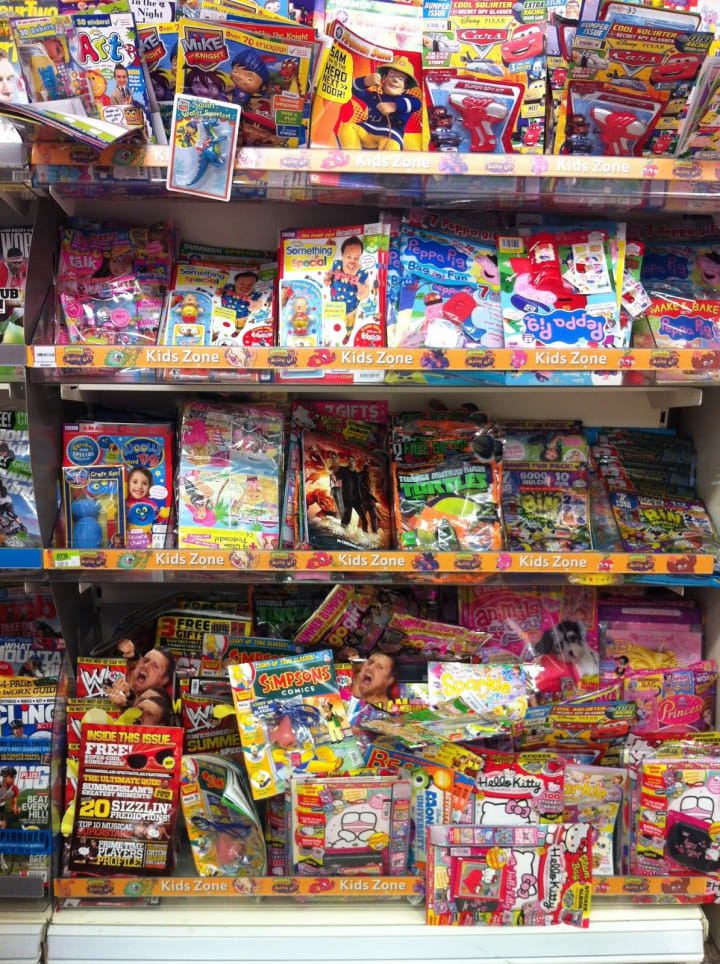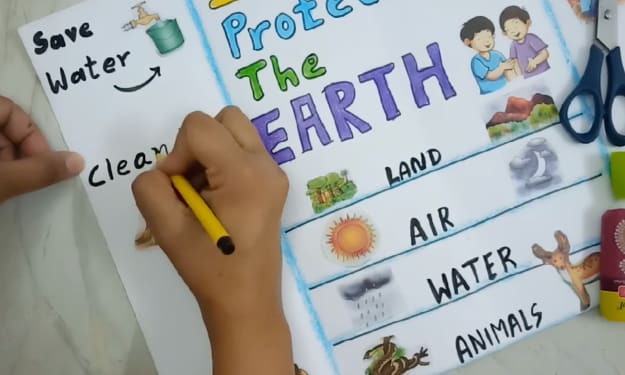Listen to your kids and stop force feeding them dangerous plastic
One store’s ban on children’s magazines is a good start

If you’ve got kids, or care for any, and are forced to sit through their favourite TV programmes on the likes of Nick Jr, Cartoon Network, Disney or Boomerang, you’ll have witnessed them being bombarded with plastic crap during every ad break.
Get them off the screen, go buy them a magazine in your nearest store and they’ll be spoilt for choice at all the free plastic gifts stuck on the front of the various publications.
These magazines are expensive, they’re just not worth it, but the child’s cry of “but these toys come with it!” usually forces the parent to give in, just to keep their little cherub happy.
But let’s face it, the toys stuck on the front of magazines are usually garbage. Not fit for purpose. They break almost immediately and soon become lost down the side of a sofa, under a bed, in the garden, in the car…
My two boys — aged 6 and 8 — have a neat little basket filled with plastic tat from magazines. From when I used to buy them. I don’t pretend that it’s all gathered there, plenty of pieces have gone missing.
So it was with deep joy that I heard UK supermarket chain Waitrose had banned children’s magazines with plastic toys attached to them.
Now the same action should be taken by EVERY store across the WORLD. Only then will magazine publishers remove the offending items.

'Plastic is polluting every corner of the planet'
You may think the toys are harmless, just a bit of fun, they keep the kids entertained and happy. If so, you aren’t seeing the big picture. And you need to see the big picture.
Read the words of Greenpeace. They are experts on this subject. REAL experts:
Plastic is polluting every corner of the planet. It has found its way to the depths of our oceans, to remote forest paths, to the ice of the Arctic, and onto the island beaches where turtles nest. We don’t know exactly how long oil-based plastic will take to degrade (or even if it ever will), but we do know that once it’s in our soil, rivers, and oceans, it is impossible to clean up. The plastic we see washing up on shores and floating on the water’s surface is only the tip of the trashberg. Over two-thirds of the plastic in our oceans ends up on the sea floor, creating an ever-growing wasteland beneath the waves. To make matters worse, bottles, bags, and other plastic junk gradually break into smaller and smaller pieces known as microplastics, which further damage ecosystems even as they’re invisible to the naked eye.
Terrifying, isn’t it?
And a report by the World Economic Forum predicted that, by 2050, there will more plastic in the sea than fish, by weight. Utterly devastating.
Watch this powerful video below about the damage single-use plastic is causing to the world:
Don’t rely on recycling
Listen, the younger generation are our only hope in saving this precious planet of ours. Poisonous plastic particles exist in pretty much all living things on land and in water now, inhaled or ingested. These KILL. These destroy ecosystems. This is big news.
Kids are largely knowledgable about such things in many countries. My six-year-old is currently learning at school about the horrors of plastic pollution, and its devastating effects on wildlife. He understands why Daddy won’t buy him magazines any more with gel-filled, glittery plastic rubbish stuck on the front.
Many children are better educated and more concerned about plastic pollution than the adults in this world of ours — they’re the ones who are going to have to live longer with the consequences, after all.
But the marketing type adults who care far more about making money than saving the natural world, ramp up their targeting of tiny children and their uneducated families with wave after wave of damaging ‘toys’ destined to be played with maybe once, lost, and ending up anywhere from the local drain to rivers, to landfill, to who knows where…
What about recycling?
Don’t live in denial, please. Don’t think that all plastic waste gets recycled. In fact, only 9% of plastic globally gets recycled. What about household plastics collected or taken to waste facilities in developed countries? Here too, the rate is often far less than 50%.

Can we really make a difference?
YES, we can change things! People power is a stronger force than you may think. And children are leading the way.
The Waitrose ban came into force because of a campaign by a 10-year-old child.
Waitrose gave credit to a young Welsh girl called Skye, who had called on publishers to stop giving away disposable toys in magazines.
Skye told the BBC:
“I’m really pleased so many people have agreed with me and supported my petition — I want to thank everyone who has signed and shared my campaign to ban plastics from comics and magazines.
“Thank you to Waitrose for agreeing with us and no longer selling the unwanted plastic tat.
“I hope all retailers can do the same and then the publishers will realise this is not acceptable anymore. We really like the magazines — we just don’t want or need the plastic packaging or the cheap plastic toys.”
Good on you, Skye. The ban will not include educational or reusable craft items, such as colouring pens and collectable models, as these are designed to be used multiple times. This interpretation is always open to review, however.
Marija Rompani, partner and director of sustainability and ethics at Waitrose, said in a statement:
“While we know these magazines are popular with children, some of the unnecessary plastic attached to them has become really excessive.
“Many in the younger generation really care about the planet and are the ones inheriting the problem of plastic pollution.
“We urge publishers to find alternatives, and other retailers to follow our lead in ending the pointless plastic that comes with children’s magazines.”
The kids are shaming us
It is not the first time that children have forced big business to take action for the sake of our natural world. And it won’t be the last. Adults, read and learn.
In 2019, fast-food giant Burger King announced it would remove all plastic toys from its kids meals, following a 400,000-name petition put together by schoolgirls Ella and Caitlin McEwan.
Just this year, the UK-led fundraiser Comic Relief gave in to pressure from children and agreed not to make any more of its money-spinning red noses from plastic.
Pupils in Cornwall were supported by the godfather of nature TV documentaries, Sir David Attenborough, and the new noses have been made from bagasse, a natural by-product of sugar cane.

And look at the remarkable efforts of Amy and Ella Meek, aged 17 and 15, who wanted to do an environmental project when being homeschooled in 2020, due to Covid-19 restrictions preventing them from attending lessons.
Before long, they had formed a charity, Kids Against Plastic, and in just 12 months they picked up more than 82,000 pieces of single-use plastic litter, developed an app to log it, found the confidence to present their own TEDx talk and gathered a team of children from across the UK, who are now tackling plastic pollution.
Children are showing the world the way. It’s time we adults stopped forcing harmful plastics on them and joined forces to provide them with a healthier future.
Read more environmental news and tips on how to live an eco-friendly life at greengreengreen.org.
About the Creator
Mark Campbell
Journalist and blogger, editor of greengreengreen.org, on a mission to inform, educate and entertain






Comments
There are no comments for this story
Be the first to respond and start the conversation.